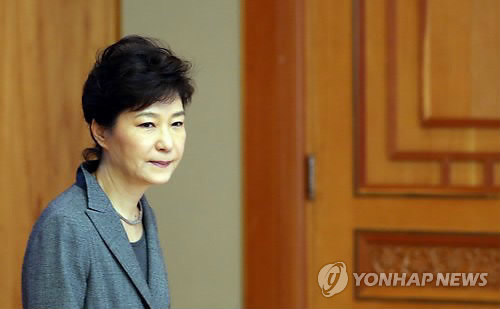As a wave of corporate restructuring looms, Korea is moving to shore up capital at policy banks, with a Korean-style “quantitative easing” considered as one option of doing so.
Starting next week, a task force comprising officials from the Finance Ministry, financial authorities, central bank and policy lenders Korea Development Bank and Export-Import Bank of Korea will begin work on the bank recapitalization plan, the Finance Ministry said Wednesday.
Starting next week, a task force comprising officials from the Finance Ministry, financial authorities, central bank and policy lenders Korea Development Bank and Export-Import Bank of Korea will begin work on the bank recapitalization plan, the Finance Ministry said Wednesday.

“It will lead discussions on the size of capital needed for restructuring of troubled industries, as well as the methods of bank recapitalization,” a Finance Ministry official said.
Restructuring of shipping and shipbuilding companies has emerged as a front-burner issue for Asia’s fourth-largest economy, which has been struggling for growth amid a global trade slump.
The latest to succumb to piles of debt in the shipping and shipbuilding sector, Hanjin Shipping on Monday filed for creditors-led restructuring.
State-run KDB is the main creditor of Hanjin, Korea’s biggest container carrier, as well as a score of other firms such as Hyundai Merchant Marine and STX Offshore & Shipbuilding Co.
KDB and Korea Eximbank, the two main policy banks, together have nearly 20 trillion won ($17.4 billion) in outstanding loans to shipping lines and shipbuilders, according to the banks. Nonperforming loans at KDB and Korea Eximbank amount to a combined 11.4 trillion won at the end of last year, up 118 percent from a year earlier. KDB’s BIS capital adequacy ratio stood at around 14 percent, while Korea Eximbank’s was slightly below 10 percent last year.
On Tuesday, President Park Geun-hye publicly backed her Saenuri Party’s idea, dubbed the Korean quantitative easing program, to have the BOK provide liquidity to policy lenders in order to aid the corporate restructuring process.
“Korean QE, unlike that of Japan, is for a specific purpose of supporting corporate restructuring,” a Cheong Wa Dae official explained Wednesday, after Park’s remarks reignited a debate over the efficiency of unconventional monetary policy tools, including negative rates, currently being used by central banks in Japan, Europe and some other economies.
As for the methods of the easing, the official said that the BOK could buy bonds issued by the KDB, as proposed by Saenuri Party, or just directly inject capital in KDB. Either way, it would require a revision of current laws. The BOK’s purchase of Korea Eximbank bonds, however, is allowed already.
Park’s ruling camp lost a parliamentary majority in the general election earlier this month. The opposition parties oppose the idea, saying conventional measures -- fiscal and interest-rate policies -- should be considered first.
The BOK has held the base interest rate at a record-low 1.5 percent for the 10th consecutive month, while the Finance Ministry is sticking to its stance that a supplementary budget is not required.
BOK Gov. Lee Ju-yeol last week voiced his opposition to the proposed bond purchase program, saying the KDB appears to have no difficulty in raising capital from the market.
By Lee Sun-young (milaya@heraldcorp.com)
Restructuring of shipping and shipbuilding companies has emerged as a front-burner issue for Asia’s fourth-largest economy, which has been struggling for growth amid a global trade slump.
The latest to succumb to piles of debt in the shipping and shipbuilding sector, Hanjin Shipping on Monday filed for creditors-led restructuring.
State-run KDB is the main creditor of Hanjin, Korea’s biggest container carrier, as well as a score of other firms such as Hyundai Merchant Marine and STX Offshore & Shipbuilding Co.
KDB and Korea Eximbank, the two main policy banks, together have nearly 20 trillion won ($17.4 billion) in outstanding loans to shipping lines and shipbuilders, according to the banks. Nonperforming loans at KDB and Korea Eximbank amount to a combined 11.4 trillion won at the end of last year, up 118 percent from a year earlier. KDB’s BIS capital adequacy ratio stood at around 14 percent, while Korea Eximbank’s was slightly below 10 percent last year.
On Tuesday, President Park Geun-hye publicly backed her Saenuri Party’s idea, dubbed the Korean quantitative easing program, to have the BOK provide liquidity to policy lenders in order to aid the corporate restructuring process.
“Korean QE, unlike that of Japan, is for a specific purpose of supporting corporate restructuring,” a Cheong Wa Dae official explained Wednesday, after Park’s remarks reignited a debate over the efficiency of unconventional monetary policy tools, including negative rates, currently being used by central banks in Japan, Europe and some other economies.
As for the methods of the easing, the official said that the BOK could buy bonds issued by the KDB, as proposed by Saenuri Party, or just directly inject capital in KDB. Either way, it would require a revision of current laws. The BOK’s purchase of Korea Eximbank bonds, however, is allowed already.
Park’s ruling camp lost a parliamentary majority in the general election earlier this month. The opposition parties oppose the idea, saying conventional measures -- fiscal and interest-rate policies -- should be considered first.
The BOK has held the base interest rate at a record-low 1.5 percent for the 10th consecutive month, while the Finance Ministry is sticking to its stance that a supplementary budget is not required.
BOK Gov. Lee Ju-yeol last week voiced his opposition to the proposed bond purchase program, saying the KDB appears to have no difficulty in raising capital from the market.
By Lee Sun-young (milaya@heraldcorp.com)
-
Articles by Korea Herald









![[Hello India] Hyundai Motor vows to boost 'clean mobility' in India](http://res.heraldm.com/phpwas/restmb_idxmake.php?idx=644&simg=/content/image/2024/04/25/20240425050672_0.jpg&u=)









